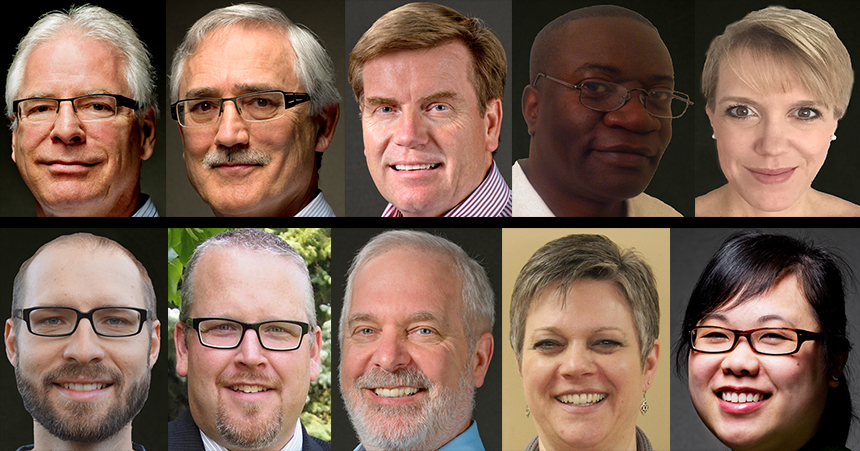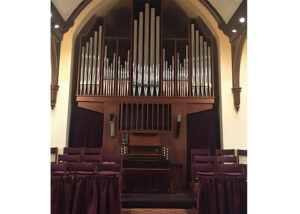The numerous staff changes at Mennonite Church Eastern Canada in the last year have been coming for a long time.

Bottom (from left to right): Kevin Derksen, Norm Dyck, Brian Bauman, Marilyn Rudy-Froese and Mollee Moua
David Martin, the regional church’s executive minister, believes that the 2005 MC Eastern Canada restructuring influenced the new mission statement and began to shift staff structures and job assumptions. “Extending the peace of Jesus Christ: Making disciples, growing congregations, forming leaders” is part of the thinking that has moved the regional church toward a focus that has become one of “supporting congregations to be more engaged in witness in their local communities, locally, regionally, nationally and internationally,” he says. “The focus and target [have] been to help congregations to think beyond themselves, to see themselves as less centred on self-care and more focussed on engaging their faith in the marketplace, with their neighbours.”
Henry Paetkau, the area church minister, adds that this has been “a shift from delivering and providing program support.”
Al Rempel, now the full-time regional minister, has developed a congregational assessment tool together with Credence and Co. that helps congregations see what their passions, internal gifting and resources are, a move away from helping congregations in visioning and goal-setting.
To his role have recently been added three quarter-time regional minister associates—Roberson Mbayamvula, Catherin van Sintern Dick and Kevin Derksen—to “pastor pastors” so that they can help their congregations be faithful in their “increasingly secular” local context. This includes the increasingly intercultural nature of the church with both new Canadian congregations, and many new Canadians in and around established local congregations.
MC Canada’s restructuring has also focussed mission work within congregations, including International Witness through a relational funding model that requires part of each worker’s support to come directly from local congregations.
To help make these connections, Norm Dyck begins a two-pronged role—Witness connections and overseeing the ReLearning Community process MC Eastern Canada is recommending for all congregations.
Less a program, and more of a way for congregations to look for God at work in their community and join God in that work, ReLearning Community helps individuals and congregations connect with their own needs and also connect with God and the community around them.
Dyck’s first task will be to go to Myanmar to help develop an Anabaptist presence there. Eight years ago, when Brian Bauman, the regional church’s mission minister, first went there, the question was, Why is a regional church engaging internationally? Now it is part of the regional church’s role to be doing such work, and the presence of several Chin congregations in MC Eastern Canada is driving this particular connection.
Paetkau is retiring this spring, to be replaced by Marilyn Rudy-Froese. This position has changed over the years, from conference minister to area church minister, and is now changing again to church leadership minister.
In writing about her role, Rudy-Froese says, “As I have engaged with pastors at all levels of experience . . . [I have] heard their visions for the church and how God is calling us to move out of our comfort zones and build relationships with our neighbours and communities around us.”
“When Henry [Paetkau] was called,” says Martin, “there was already a move away from just administration, to helping pastors to take on the challenging questions of their ministry situation. With Rudy-Froese, there is a strong emphasis to help pastors and congregations to respond to the new context,” and to help them answer the question, “ ‘Where is God calling the pastor and congregation in their community?’ ”
Again, a focus on the intercultural community—in which there is comprehensive mutuality, reciprocity and equality between people of different cultures, nationalities or religions—in MC Eastern Canada and its congregations is key. “This is a journey we’re on,” says Bauman. “We are currently multicultural [in which people groups live alongside one another] and not intercultural,” adds Martin, including MC Eastern Canada staff.
But the lengthy presence of Mollee Moua from First Hmong Mennonite Church in Kitchener on the administrative staff has helped the Hmong feel more ownership of the regional church.
While no more changes are imminent, Bauman, Paetkau and Martin admit that there are more changes on the horizon as current senior leaders reach retirement.
The way Martin tells the story of these staff changes, while it may look like a flurry of recent activity, it has been slowly developing over many years, repositioning MC Eastern Canada to support congregations to discover their calling from God and to give them resources to fulfill their particular, local callings.







Leave a Reply
You must be logged in to post a comment.